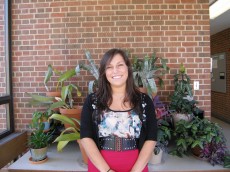An Alternative Lifestyle Leading to an Alternative to Debt
 Daniella Brutman ‘12 is a junior from Vernon Hills, Illinois, majoring in neuroscience and biology.
Daniella Brutman ‘12 is a junior from Vernon Hills, Illinois, majoring in neuroscience and biology.
Daniella Brutman
Download PDF

Emily Pospiech ’09 attends Rosalind Franklin University of Science and Medicine and has received the F. Edward Hébert Armed Forces Health Professions Scholarship Program (HPSP).
Being a quarter of a million dollars in debt is a reality for most students attending medical school, so is it even possible to graduate and not owe a dime? Imagine coming out of medical school with financial and occupational security. As impossible as it may sound, every year, a select group of individuals who have chosen and have been chosen to receive the F. Edward Hébert Armed Forces Health Professions Scholarship Program (HPSP) will come out of medical school debt free. Both Katie Rice ’09 and Emily Pospiech ’09 have made this commitment to the U.S. armed forces by accepting the Armed Forces Scholarship. As a junior seriously considering this scholarship, listening to their advice and considering their experiences serves as an invaluable resource for making this decision.
The F. Edward Hébert Armed Forces Health Professions Scholarship Program is available to students applying to graduate programs in the medical, dental, nursing, psychological, and veterinary fields. Students must meet a set of eligibility guidelines, including qualifying as an officer in the army reserve1. As a part of the HPSP, upon accepting this scholarship, you are commissioned as a Second Lieutenant in the army reserve and then promoted to the rank of Captain after graduation from graduate school1. The HPSP covers not only 100% of tuition, books, and equipment fees, but it also provides students with a monthly living stipend of almost $2000, a $20000 signing bonus, and officer’s pay during summer training sessions1. Just looking at the monetary benefits that this scholarship provides makes it seem like this is a simple decision, but there are other aspects of this scholarship to consider that are not as clear-cut. Emily made a point to caution that “it is a huge commitment and not something that you should step into without doing some research if it is not something that you had originally considered” (Pospiech).
Emily Pospiech is in her first year at Rosalind Franklin Medical School. She has yet to attend her first summer officer training session, but is optimistic and looks forward to the experience. Emily decided that taking a gap-year after graduating from Lake Forest College in 2009 was the best decision for her, and in that time she learned more about the HPSP. She did not take accepting the HPSP lightly. After meeting with her recruitment officer, Emily sat down and did an extensive amount of research. She discussed this decision with her family and took her future goals into consideration. She understood that “stepping into the armed forces, regardless if you are going in as regular infantry or taking a different route, means that you have to know what you are getting yourself into” (Pospiech). While Emily understands the path ahead of her, she is currently just trying to keep her head above water in medical school, and cannot wait to begin officer training camp this summer.
Emily actually heard about the HPSP through Katie Rice, who is in her second year at Rocky Vista University College of Osteopathic Medicine and went through officer training camp this past summer. Katie is further along in the process than Emily, but they both spent a great deal of time deciding to make this commitment. After researching both the benefits and drawbacks to this lifestyle choice, Katie decided that “the HPSP scholarship [was] really almost too good to be true and after learning about all the benefits [she] could not turn it down” (Rice). On top of the monetary benefits, she was genuinely excited to be a part of the U.S. Army. Another advantage Katie noticed throughout the first year of her medical school experience was the scholarship’s ability to alleviate the financial stress associated with medical school. Katie believes that, “overall, this scholarship makes school a lot less stressful” (Rice). The HPSP provides Katie with the opportunity to focus solely on being a medical student by relieving her of worrying about finances.
Any student looking into the Edward Hébert Armed Forces Health Professions Scholarship Program should take their advice into consideration, and “remember that many medical school graduates have gone through school on loans, but have come out and paid everything off, while still having a successful and fun career” (Pospiech). Before talking to both Emily and Katie, I doubted being able to make this commitment, but their positive experiences with and opinions on HPSP have provided me with a new lens to view this amazing opportunity. I have spent the entirety of this year considering the possibility of applying for this scholarship, and listening to the advice provided by both of these Lake Forest College alumni forced me to question my intentions in considering this scholarship. Doing so made me come to the conclusion that while the monetary benefits are important, I need to be able to live an army lifestyle, which is an idea I still need to ponder.